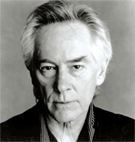McClure delivers a passion for poetry
 I am visited by a man
I am visited by a man who is the god of foxes
there is dirt under the nails of his paw
fresh from his den.
We smile at one another in recognition.
- Michael McClure, "Peyote Poem" (1958)
Seeking the unexpected is almost as important as the quest for meaning to Michael McClure, the pioneering Beat Generation poet who served as a mentor to Doors` singer Jim Morrison and wrote "Mercedes Benz," one of Janis Joplin`s most endearingly quirky songs.
"It`s very important to surprise myself," said McClure, who performed recently at Sherwood Auditorium in La Jolla, Calif., at the opening program of this year`s Artists on the Cutting Edge series.
"I`m one of those artists who say: `Well, if I knew what it was before I do it, I wouldn`t sit down to do it,`" he continued. "I do it to find out what it is."
For this veteran writer and erstwhile cultural revolutionary, "it" can - and does - take many forms. Now 66, he is an insightful novelist and essayist, an Obie-winning playwright and an esteemed poet, whose five decades of work can be sampled on the Web at www.thing.net/(tilde) grist/l&d/mcclure/mcclure.htm. He`s now recording two albums with pioneering minimalist composer Terry Riley, who contributed the music to a just-concluded Bay Area production of McClure`s play "Josephine the Mouth Singer."
McClure is also a longtime partner of former Doors` keyboardist Ray Manzarek, with whom he has performed poetry-meets-music shows since joining forces in 1988. The two are featured in "The Third Mind," a 60-minute video released last year by Mystic Fire (www.mysticfire.com). It showcases their work together, along with cameos by such kindred spirits as Lawrence Ferlinghetti, Anne Waldman and Fugs` co-founder Ed Sanders.
But it is poetry that remains McClure`s first and greatest passion, and his most vital outlet for creative expression.
"I would say you either are a poet - and there is nothing you can do about it - or you`re not," he said, speaking from his California home. "And the only thing that teaches poetry to you is your own experience. It`s not a profession, it`s an art."
Recalling his days as a fledgling young writer in the early 1950s, McClure said: "I never had any interest in poetry as a profession. No poet or painter I knew back then had any indication they would publish a book or sell a painting. You did it because you were driven. Now, it`s a different world."
HEARTLAND ROOTS
It was McClure`s zeal for poetry that brought him to San Francisco from his native Kansas nearly half a century ago.
Like other seekers before and since, he sensed that California`s fabled city by the bay offered limitless possibilities. And the possibilities for American poets were limited in the late 1940s and early `50s, when McClure decided to pursue the power of words and their ability to convey the richness of human existence.
"Even when I got to San Francisco, there couldn`t have been more than maybe 20 people who had the nerve to stand up (in public) and read a poem," he recalled. "The country was in such a depressed and enraged state of Cold War thinking then that there was no tolerance for such a thing as poetry out there. And maybe the only tolerance in San Francisco was in North Beach. Because as (fellow Beat poet) Ken Rexroth said: `North Beach is to poets as Barcelona was to Spanish anarchists.` It was a place where you could just be, although you couldn`t declare: `I am a poet,` because you`d get yelled at - and maybe even hit - if you did.
"I didn`t worry about that. But people were violently opposed to anything that went against conformity. And poetry in this country was on its dying toes."
But not for long.
On Oct. 7, 1955, he joined with several other maverick poets, most notably Allen Ginsberg (who appeared at McClure`s invitation), for a public reading at San Francisco`s 6 Gallery. It was then that Ginsberg debuted his epic poem, "Howl." And it was then that the Beat Generation took root, driven by the mind-expanding imagery and full-throttle passion for living of Ginsberg, McClure and such cohorts as Ferlinghetti, Gary Snyder and Jack Kerouac. With liberating force, their work galvanized many in a white-bread, button-down generation of young Americans eager for an alternative to the pervasive conservatism of the day.
The Beats` emphasis on freedom, spirituality, sexuality and proto-environmentalism was visionary. Ditto their sometimes zany, Dada-inspired use of humor, especially in an era in which almost any deviation from the norm or expression of individuality was regarded with suspicion and hostility.
"I`d seen one poetry reading before the 6 Gallery reading, but it was a `good-time reading.` At this one, the veil of silence was broken," McClure proudly recalled. "I don`t know whether anything comparable is happening today or not. I figure, if it`s happening now, how would I know? And," he added with a laugh, "why would they want me to know?"
(c) Copley News Service
advertisement

Related Articles
Author: George Varga
Archives
Van Gogh and Gauguin together again
Harry`s Here
Memoir recalls courtship in Dachau
Mr. Smith goes to Hollywood
Moises Kaufman
And now ... the rest of the story
Finally, a time for Grandma
Homing in on Homer`s distinctly American flair
Gidget is back, and she`s original
Ego tours: rock and roles
Springtime for Brooks
The cradle does rock
Behind their music
Fluid approach to architecture is hallmark of modernist
New American plays mirror transitional theme
More Articles







